Comprehensive Analysis: Australian Visa System, Laws, and Regulations
VerifiedAdded on 2019/11/20
|10
|2236
|316
Report
AI Summary
This report provides a comprehensive legal analysis of the Australian visa system, focusing on several key aspects. It begins by examining the case of Aysel, a Turkish resident holding a subclass 590 student visa, and explores the conditions attached to this visa, including restrictions on work and requirements for health insurance. The report delves into the implications of Aysel's desire to marry an Australian citizen and seek permanent residency, analyzing the 'no further stay' clause (8534) and its exceptions. The second part of the report addresses the situation of Melek, Aysel's daughter, who becomes an orphan after her mother's death. It examines the subclass 117 visa for orphans, outlining eligibility criteria and the role of relatives as guardians. The analysis highlights the importance of blood relations and the limitations faced by Melek's uncle, who is not a blood relative. Finally, the report considers the adoption visa (subclass 102) as a potential solution for Melek, detailing the requirements for adoption, including age, residency, health certificates, and the financial responsibilities of the adopting parents. The report concludes by advising Melek's uncle on the available options and the necessary steps to pursue the subclass 102 visa.
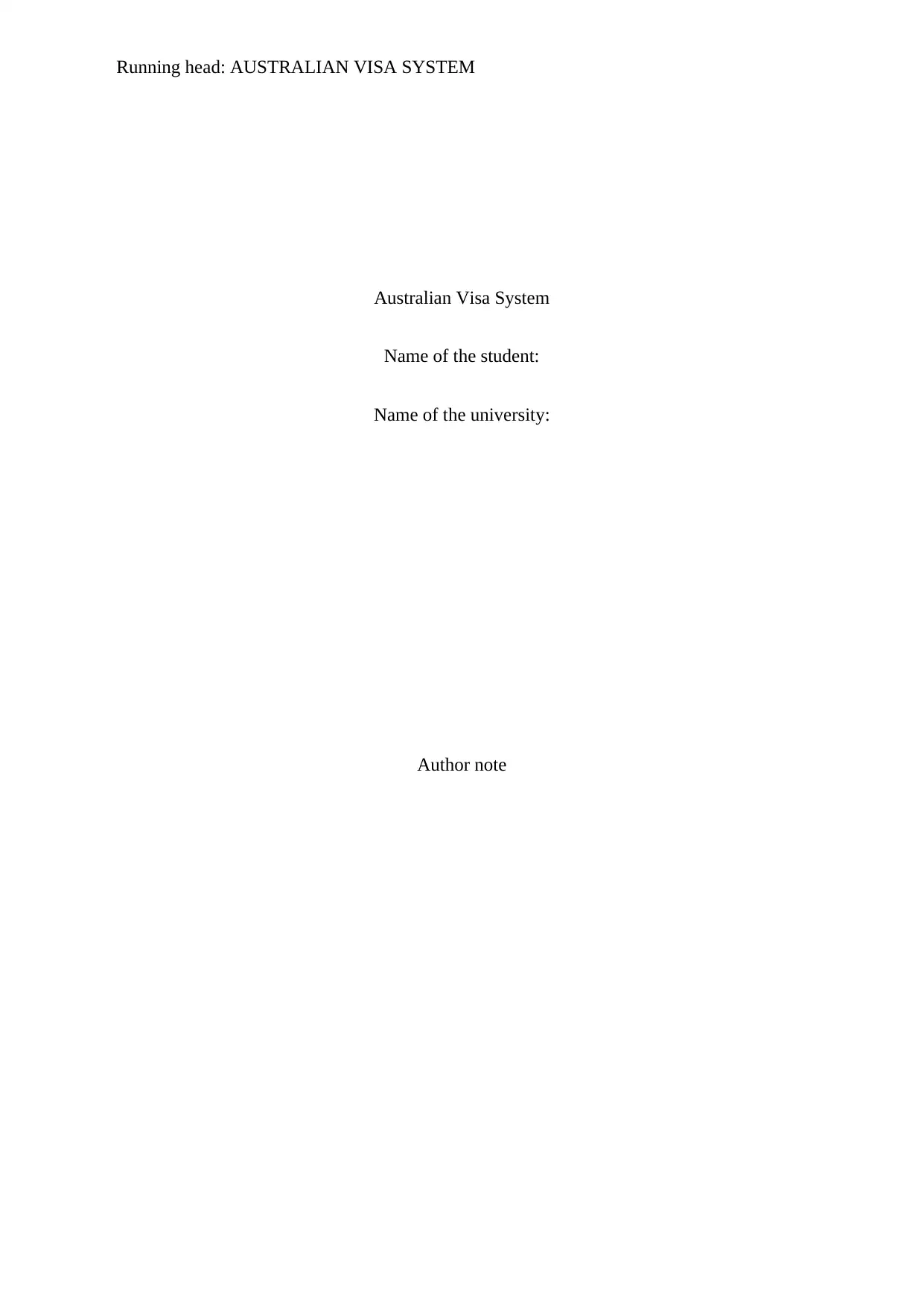
Running head: AUSTRALIAN VISA SYSTEM
Australian Visa System
Name of the student:
Name of the university:
Author note
Australian Visa System
Name of the student:
Name of the university:
Author note
Paraphrase This Document
Need a fresh take? Get an instant paraphrase of this document with our AI Paraphraser
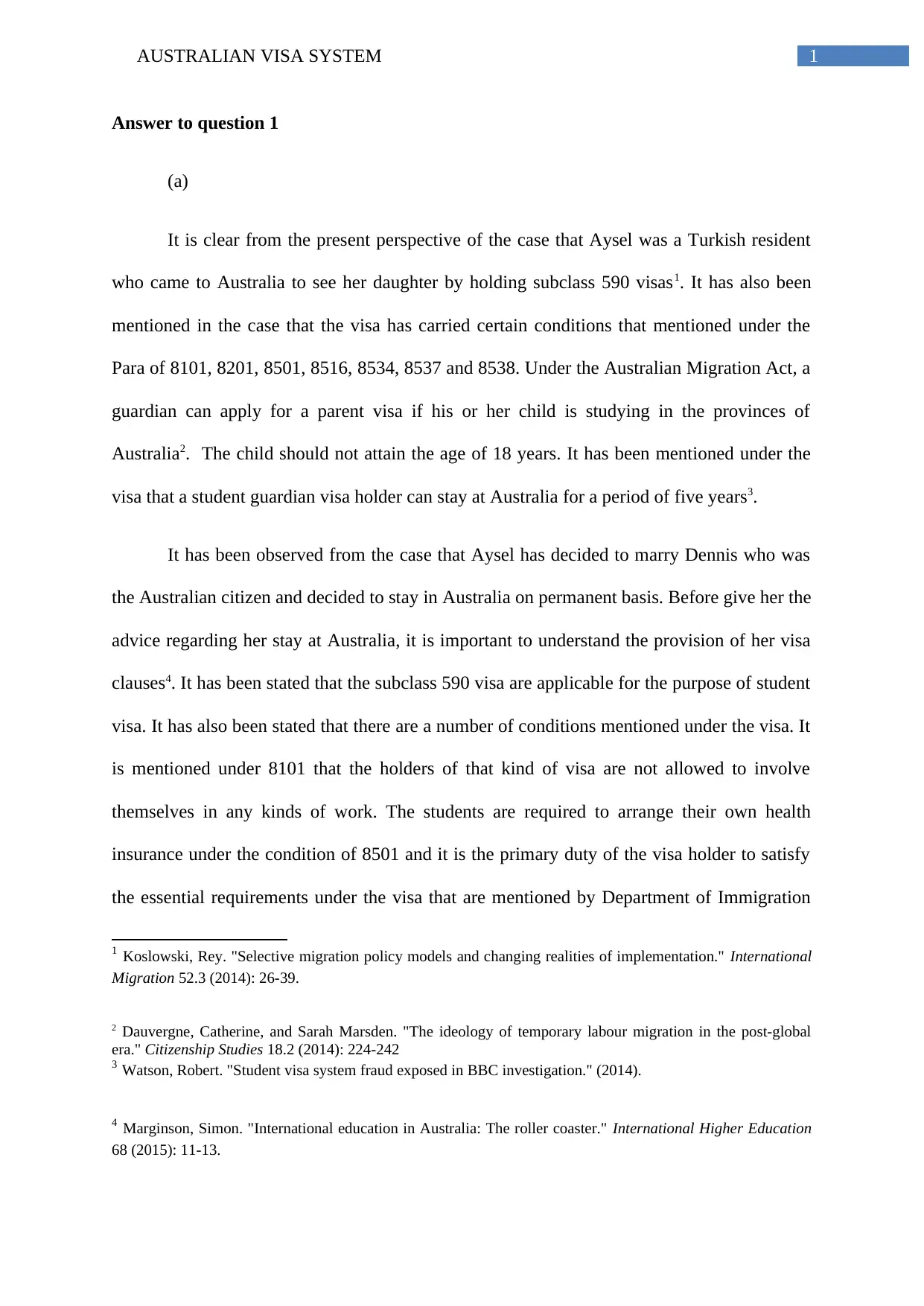
1AUSTRALIAN VISA SYSTEM
Answer to question 1
(a)
It is clear from the present perspective of the case that Aysel was a Turkish resident
who came to Australia to see her daughter by holding subclass 590 visas1. It has also been
mentioned in the case that the visa has carried certain conditions that mentioned under the
Para of 8101, 8201, 8501, 8516, 8534, 8537 and 8538. Under the Australian Migration Act, a
guardian can apply for a parent visa if his or her child is studying in the provinces of
Australia2. The child should not attain the age of 18 years. It has been mentioned under the
visa that a student guardian visa holder can stay at Australia for a period of five years3.
It has been observed from the case that Aysel has decided to marry Dennis who was
the Australian citizen and decided to stay in Australia on permanent basis. Before give her the
advice regarding her stay at Australia, it is important to understand the provision of her visa
clauses4. It has been stated that the subclass 590 visa are applicable for the purpose of student
visa. It has also been stated that there are a number of conditions mentioned under the visa. It
is mentioned under 8101 that the holders of that kind of visa are not allowed to involve
themselves in any kinds of work. The students are required to arrange their own health
insurance under the condition of 8501 and it is the primary duty of the visa holder to satisfy
the essential requirements under the visa that are mentioned by Department of Immigration
1 Koslowski, Rey. "Selective migration policy models and changing realities of implementation." International
Migration 52.3 (2014): 26-39.
2 Dauvergne, Catherine, and Sarah Marsden. "The ideology of temporary labour migration in the post-global
era." Citizenship Studies 18.2 (2014): 224-242
3 Watson, Robert. "Student visa system fraud exposed in BBC investigation." (2014).
4 Marginson, Simon. "International education in Australia: The roller coaster." International Higher Education
68 (2015): 11-13.
Answer to question 1
(a)
It is clear from the present perspective of the case that Aysel was a Turkish resident
who came to Australia to see her daughter by holding subclass 590 visas1. It has also been
mentioned in the case that the visa has carried certain conditions that mentioned under the
Para of 8101, 8201, 8501, 8516, 8534, 8537 and 8538. Under the Australian Migration Act, a
guardian can apply for a parent visa if his or her child is studying in the provinces of
Australia2. The child should not attain the age of 18 years. It has been mentioned under the
visa that a student guardian visa holder can stay at Australia for a period of five years3.
It has been observed from the case that Aysel has decided to marry Dennis who was
the Australian citizen and decided to stay in Australia on permanent basis. Before give her the
advice regarding her stay at Australia, it is important to understand the provision of her visa
clauses4. It has been stated that the subclass 590 visa are applicable for the purpose of student
visa. It has also been stated that there are a number of conditions mentioned under the visa. It
is mentioned under 8101 that the holders of that kind of visa are not allowed to involve
themselves in any kinds of work. The students are required to arrange their own health
insurance under the condition of 8501 and it is the primary duty of the visa holder to satisfy
the essential requirements under the visa that are mentioned by Department of Immigration
1 Koslowski, Rey. "Selective migration policy models and changing realities of implementation." International
Migration 52.3 (2014): 26-39.
2 Dauvergne, Catherine, and Sarah Marsden. "The ideology of temporary labour migration in the post-global
era." Citizenship Studies 18.2 (2014): 224-242
3 Watson, Robert. "Student visa system fraud exposed in BBC investigation." (2014).
4 Marginson, Simon. "International education in Australia: The roller coaster." International Higher Education
68 (2015): 11-13.
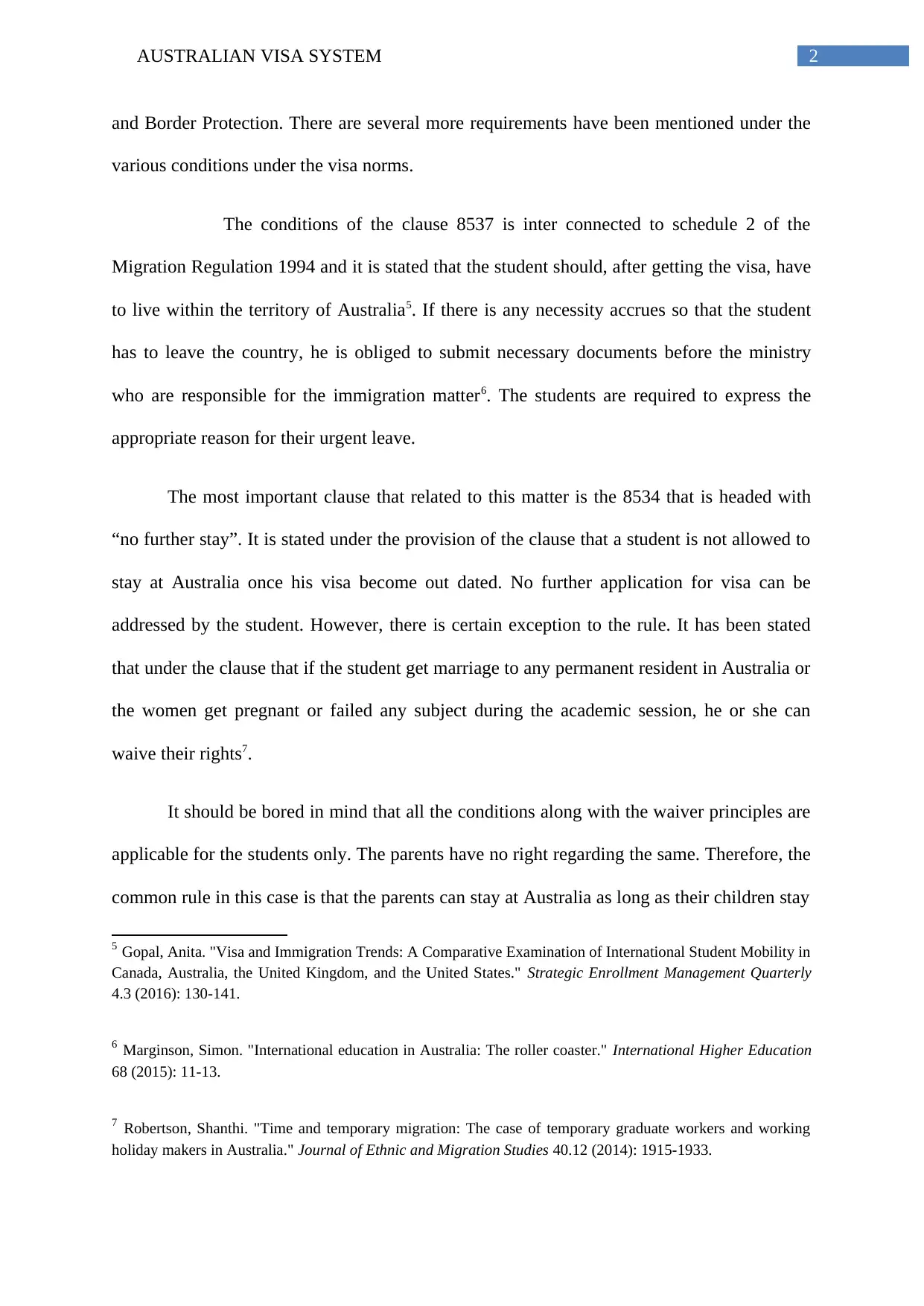
2AUSTRALIAN VISA SYSTEM
and Border Protection. There are several more requirements have been mentioned under the
various conditions under the visa norms.
The conditions of the clause 8537 is inter connected to schedule 2 of the
Migration Regulation 1994 and it is stated that the student should, after getting the visa, have
to live within the territory of Australia5. If there is any necessity accrues so that the student
has to leave the country, he is obliged to submit necessary documents before the ministry
who are responsible for the immigration matter6. The students are required to express the
appropriate reason for their urgent leave.
The most important clause that related to this matter is the 8534 that is headed with
“no further stay”. It is stated under the provision of the clause that a student is not allowed to
stay at Australia once his visa become out dated. No further application for visa can be
addressed by the student. However, there is certain exception to the rule. It has been stated
that under the clause that if the student get marriage to any permanent resident in Australia or
the women get pregnant or failed any subject during the academic session, he or she can
waive their rights7.
It should be bored in mind that all the conditions along with the waiver principles are
applicable for the students only. The parents have no right regarding the same. Therefore, the
common rule in this case is that the parents can stay at Australia as long as their children stay
5 Gopal, Anita. "Visa and Immigration Trends: A Comparative Examination of International Student Mobility in
Canada, Australia, the United Kingdom, and the United States." Strategic Enrollment Management Quarterly
4.3 (2016): 130-141.
6 Marginson, Simon. "International education in Australia: The roller coaster." International Higher Education
68 (2015): 11-13.
7 Robertson, Shanthi. "Time and temporary migration: The case of temporary graduate workers and working
holiday makers in Australia." Journal of Ethnic and Migration Studies 40.12 (2014): 1915-1933.
and Border Protection. There are several more requirements have been mentioned under the
various conditions under the visa norms.
The conditions of the clause 8537 is inter connected to schedule 2 of the
Migration Regulation 1994 and it is stated that the student should, after getting the visa, have
to live within the territory of Australia5. If there is any necessity accrues so that the student
has to leave the country, he is obliged to submit necessary documents before the ministry
who are responsible for the immigration matter6. The students are required to express the
appropriate reason for their urgent leave.
The most important clause that related to this matter is the 8534 that is headed with
“no further stay”. It is stated under the provision of the clause that a student is not allowed to
stay at Australia once his visa become out dated. No further application for visa can be
addressed by the student. However, there is certain exception to the rule. It has been stated
that under the clause that if the student get marriage to any permanent resident in Australia or
the women get pregnant or failed any subject during the academic session, he or she can
waive their rights7.
It should be bored in mind that all the conditions along with the waiver principles are
applicable for the students only. The parents have no right regarding the same. Therefore, the
common rule in this case is that the parents can stay at Australia as long as their children stay
5 Gopal, Anita. "Visa and Immigration Trends: A Comparative Examination of International Student Mobility in
Canada, Australia, the United Kingdom, and the United States." Strategic Enrollment Management Quarterly
4.3 (2016): 130-141.
6 Marginson, Simon. "International education in Australia: The roller coaster." International Higher Education
68 (2015): 11-13.
7 Robertson, Shanthi. "Time and temporary migration: The case of temporary graduate workers and working
holiday makers in Australia." Journal of Ethnic and Migration Studies 40.12 (2014): 1915-1933.
⊘ This is a preview!⊘
Do you want full access?
Subscribe today to unlock all pages.

Trusted by 1+ million students worldwide
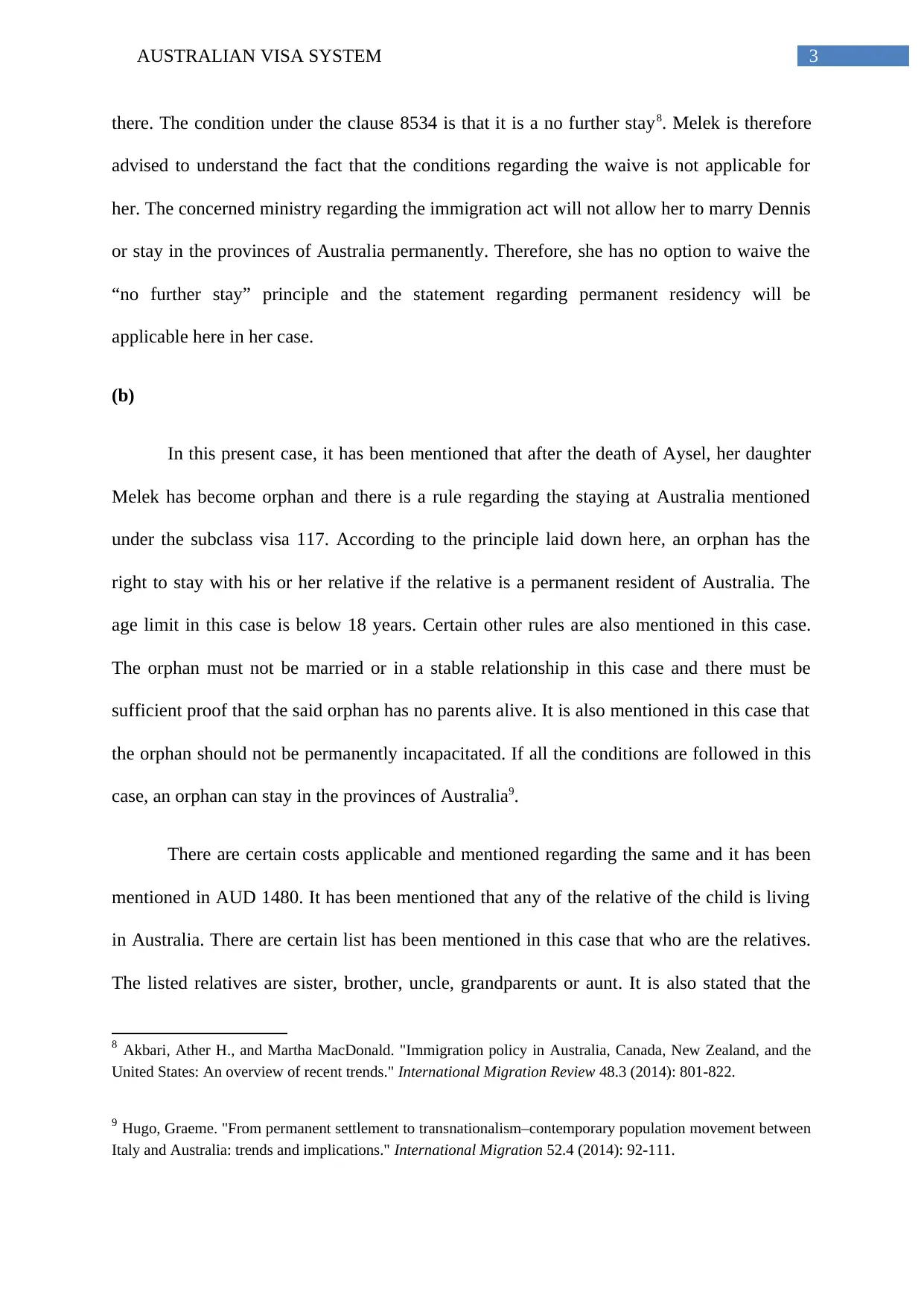
3AUSTRALIAN VISA SYSTEM
there. The condition under the clause 8534 is that it is a no further stay8. Melek is therefore
advised to understand the fact that the conditions regarding the waive is not applicable for
her. The concerned ministry regarding the immigration act will not allow her to marry Dennis
or stay in the provinces of Australia permanently. Therefore, she has no option to waive the
“no further stay” principle and the statement regarding permanent residency will be
applicable here in her case.
(b)
In this present case, it has been mentioned that after the death of Aysel, her daughter
Melek has become orphan and there is a rule regarding the staying at Australia mentioned
under the subclass visa 117. According to the principle laid down here, an orphan has the
right to stay with his or her relative if the relative is a permanent resident of Australia. The
age limit in this case is below 18 years. Certain other rules are also mentioned in this case.
The orphan must not be married or in a stable relationship in this case and there must be
sufficient proof that the said orphan has no parents alive. It is also mentioned in this case that
the orphan should not be permanently incapacitated. If all the conditions are followed in this
case, an orphan can stay in the provinces of Australia9.
There are certain costs applicable and mentioned regarding the same and it has been
mentioned in AUD 1480. It has been mentioned that any of the relative of the child is living
in Australia. There are certain list has been mentioned in this case that who are the relatives.
The listed relatives are sister, brother, uncle, grandparents or aunt. It is also stated that the
8 Akbari, Ather H., and Martha MacDonald. "Immigration policy in Australia, Canada, New Zealand, and the
United States: An overview of recent trends." International Migration Review 48.3 (2014): 801-822.
9 Hugo, Graeme. "From permanent settlement to transnationalism–contemporary population movement between
Italy and Australia: trends and implications." International Migration 52.4 (2014): 92-111.
there. The condition under the clause 8534 is that it is a no further stay8. Melek is therefore
advised to understand the fact that the conditions regarding the waive is not applicable for
her. The concerned ministry regarding the immigration act will not allow her to marry Dennis
or stay in the provinces of Australia permanently. Therefore, she has no option to waive the
“no further stay” principle and the statement regarding permanent residency will be
applicable here in her case.
(b)
In this present case, it has been mentioned that after the death of Aysel, her daughter
Melek has become orphan and there is a rule regarding the staying at Australia mentioned
under the subclass visa 117. According to the principle laid down here, an orphan has the
right to stay with his or her relative if the relative is a permanent resident of Australia. The
age limit in this case is below 18 years. Certain other rules are also mentioned in this case.
The orphan must not be married or in a stable relationship in this case and there must be
sufficient proof that the said orphan has no parents alive. It is also mentioned in this case that
the orphan should not be permanently incapacitated. If all the conditions are followed in this
case, an orphan can stay in the provinces of Australia9.
There are certain costs applicable and mentioned regarding the same and it has been
mentioned in AUD 1480. It has been mentioned that any of the relative of the child is living
in Australia. There are certain list has been mentioned in this case that who are the relatives.
The listed relatives are sister, brother, uncle, grandparents or aunt. It is also stated that the
8 Akbari, Ather H., and Martha MacDonald. "Immigration policy in Australia, Canada, New Zealand, and the
United States: An overview of recent trends." International Migration Review 48.3 (2014): 801-822.
9 Hugo, Graeme. "From permanent settlement to transnationalism–contemporary population movement between
Italy and Australia: trends and implications." International Migration 52.4 (2014): 92-111.
Paraphrase This Document
Need a fresh take? Get an instant paraphrase of this document with our AI Paraphraser
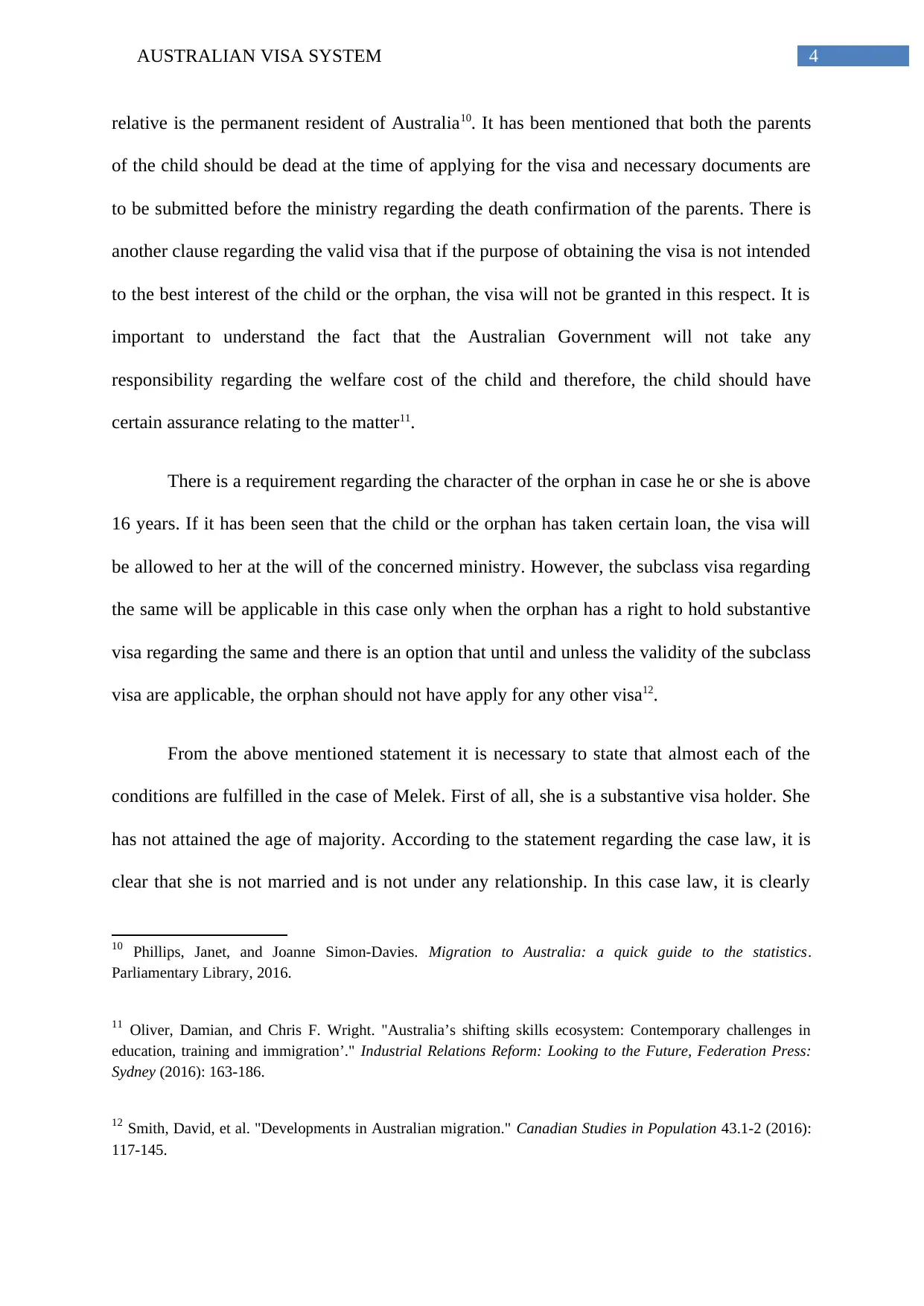
4AUSTRALIAN VISA SYSTEM
relative is the permanent resident of Australia10. It has been mentioned that both the parents
of the child should be dead at the time of applying for the visa and necessary documents are
to be submitted before the ministry regarding the death confirmation of the parents. There is
another clause regarding the valid visa that if the purpose of obtaining the visa is not intended
to the best interest of the child or the orphan, the visa will not be granted in this respect. It is
important to understand the fact that the Australian Government will not take any
responsibility regarding the welfare cost of the child and therefore, the child should have
certain assurance relating to the matter11.
There is a requirement regarding the character of the orphan in case he or she is above
16 years. If it has been seen that the child or the orphan has taken certain loan, the visa will
be allowed to her at the will of the concerned ministry. However, the subclass visa regarding
the same will be applicable in this case only when the orphan has a right to hold substantive
visa regarding the same and there is an option that until and unless the validity of the subclass
visa are applicable, the orphan should not have apply for any other visa12.
From the above mentioned statement it is necessary to state that almost each of the
conditions are fulfilled in the case of Melek. First of all, she is a substantive visa holder. She
has not attained the age of majority. According to the statement regarding the case law, it is
clear that she is not married and is not under any relationship. In this case law, it is clearly
10 Phillips, Janet, and Joanne Simon-Davies. Migration to Australia: a quick guide to the statistics.
Parliamentary Library, 2016.
11 Oliver, Damian, and Chris F. Wright. "Australia’s shifting skills ecosystem: Contemporary challenges in
education, training and immigration’." Industrial Relations Reform: Looking to the Future, Federation Press:
Sydney (2016): 163-186.
12 Smith, David, et al. "Developments in Australian migration." Canadian Studies in Population 43.1-2 (2016):
117-145.
relative is the permanent resident of Australia10. It has been mentioned that both the parents
of the child should be dead at the time of applying for the visa and necessary documents are
to be submitted before the ministry regarding the death confirmation of the parents. There is
another clause regarding the valid visa that if the purpose of obtaining the visa is not intended
to the best interest of the child or the orphan, the visa will not be granted in this respect. It is
important to understand the fact that the Australian Government will not take any
responsibility regarding the welfare cost of the child and therefore, the child should have
certain assurance relating to the matter11.
There is a requirement regarding the character of the orphan in case he or she is above
16 years. If it has been seen that the child or the orphan has taken certain loan, the visa will
be allowed to her at the will of the concerned ministry. However, the subclass visa regarding
the same will be applicable in this case only when the orphan has a right to hold substantive
visa regarding the same and there is an option that until and unless the validity of the subclass
visa are applicable, the orphan should not have apply for any other visa12.
From the above mentioned statement it is necessary to state that almost each of the
conditions are fulfilled in the case of Melek. First of all, she is a substantive visa holder. She
has not attained the age of majority. According to the statement regarding the case law, it is
clear that she is not married and is not under any relationship. In this case law, it is clearly
10 Phillips, Janet, and Joanne Simon-Davies. Migration to Australia: a quick guide to the statistics.
Parliamentary Library, 2016.
11 Oliver, Damian, and Chris F. Wright. "Australia’s shifting skills ecosystem: Contemporary challenges in
education, training and immigration’." Industrial Relations Reform: Looking to the Future, Federation Press:
Sydney (2016): 163-186.
12 Smith, David, et al. "Developments in Australian migration." Canadian Studies in Population 43.1-2 (2016):
117-145.
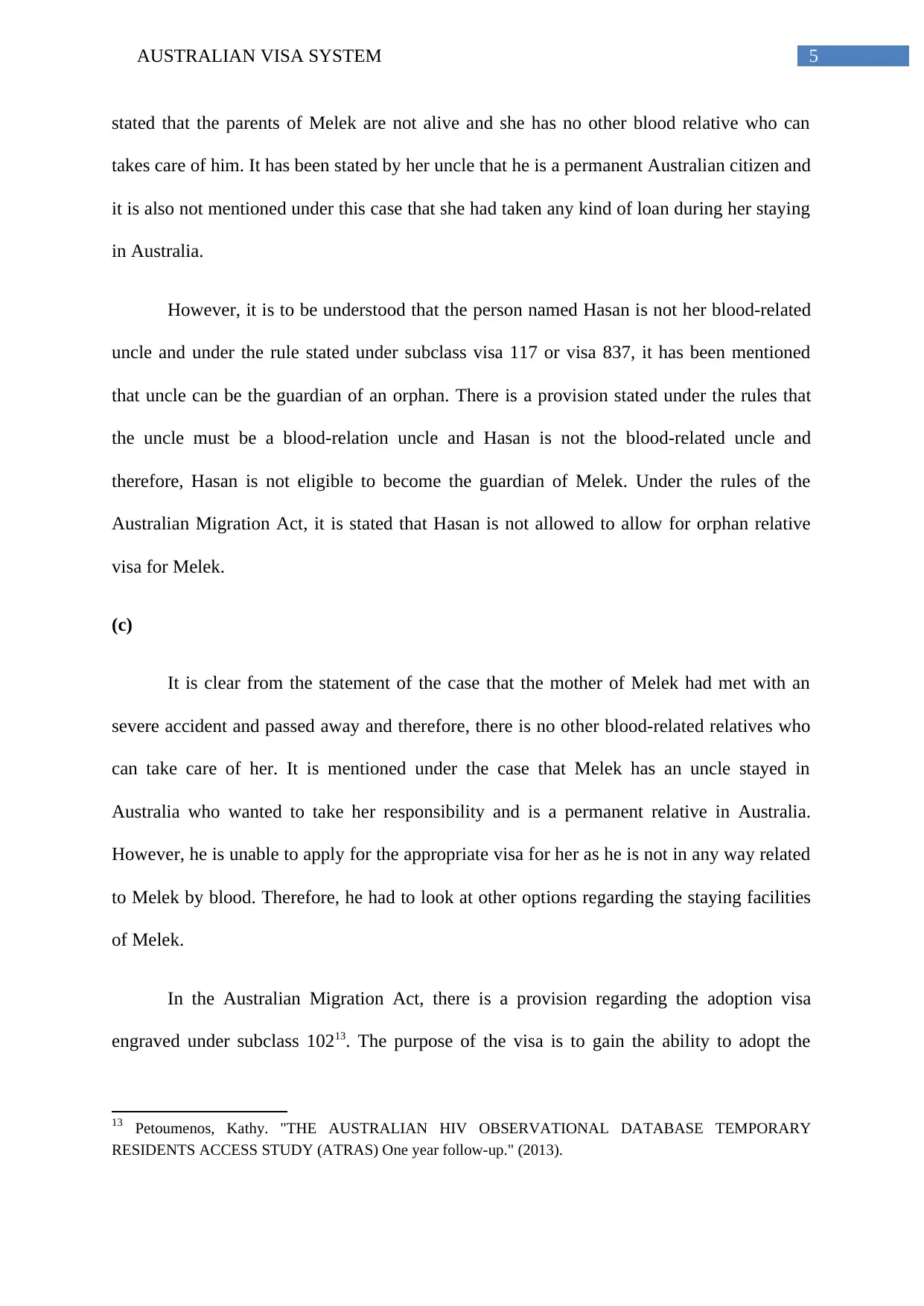
5AUSTRALIAN VISA SYSTEM
stated that the parents of Melek are not alive and she has no other blood relative who can
takes care of him. It has been stated by her uncle that he is a permanent Australian citizen and
it is also not mentioned under this case that she had taken any kind of loan during her staying
in Australia.
However, it is to be understood that the person named Hasan is not her blood-related
uncle and under the rule stated under subclass visa 117 or visa 837, it has been mentioned
that uncle can be the guardian of an orphan. There is a provision stated under the rules that
the uncle must be a blood-relation uncle and Hasan is not the blood-related uncle and
therefore, Hasan is not eligible to become the guardian of Melek. Under the rules of the
Australian Migration Act, it is stated that Hasan is not allowed to allow for orphan relative
visa for Melek.
(c)
It is clear from the statement of the case that the mother of Melek had met with an
severe accident and passed away and therefore, there is no other blood-related relatives who
can take care of her. It is mentioned under the case that Melek has an uncle stayed in
Australia who wanted to take her responsibility and is a permanent relative in Australia.
However, he is unable to apply for the appropriate visa for her as he is not in any way related
to Melek by blood. Therefore, he had to look at other options regarding the staying facilities
of Melek.
In the Australian Migration Act, there is a provision regarding the adoption visa
engraved under subclass 10213. The purpose of the visa is to gain the ability to adopt the
13 Petoumenos, Kathy. "THE AUSTRALIAN HIV OBSERVATIONAL DATABASE TEMPORARY
RESIDENTS ACCESS STUDY (ATRAS) One year follow-up." (2013).
stated that the parents of Melek are not alive and she has no other blood relative who can
takes care of him. It has been stated by her uncle that he is a permanent Australian citizen and
it is also not mentioned under this case that she had taken any kind of loan during her staying
in Australia.
However, it is to be understood that the person named Hasan is not her blood-related
uncle and under the rule stated under subclass visa 117 or visa 837, it has been mentioned
that uncle can be the guardian of an orphan. There is a provision stated under the rules that
the uncle must be a blood-relation uncle and Hasan is not the blood-related uncle and
therefore, Hasan is not eligible to become the guardian of Melek. Under the rules of the
Australian Migration Act, it is stated that Hasan is not allowed to allow for orphan relative
visa for Melek.
(c)
It is clear from the statement of the case that the mother of Melek had met with an
severe accident and passed away and therefore, there is no other blood-related relatives who
can take care of her. It is mentioned under the case that Melek has an uncle stayed in
Australia who wanted to take her responsibility and is a permanent relative in Australia.
However, he is unable to apply for the appropriate visa for her as he is not in any way related
to Melek by blood. Therefore, he had to look at other options regarding the staying facilities
of Melek.
In the Australian Migration Act, there is a provision regarding the adoption visa
engraved under subclass 10213. The purpose of the visa is to gain the ability to adopt the
13 Petoumenos, Kathy. "THE AUSTRALIAN HIV OBSERVATIONAL DATABASE TEMPORARY
RESIDENTS ACCESS STUDY (ATRAS) One year follow-up." (2013).
⊘ This is a preview!⊘
Do you want full access?
Subscribe today to unlock all pages.

Trusted by 1+ million students worldwide
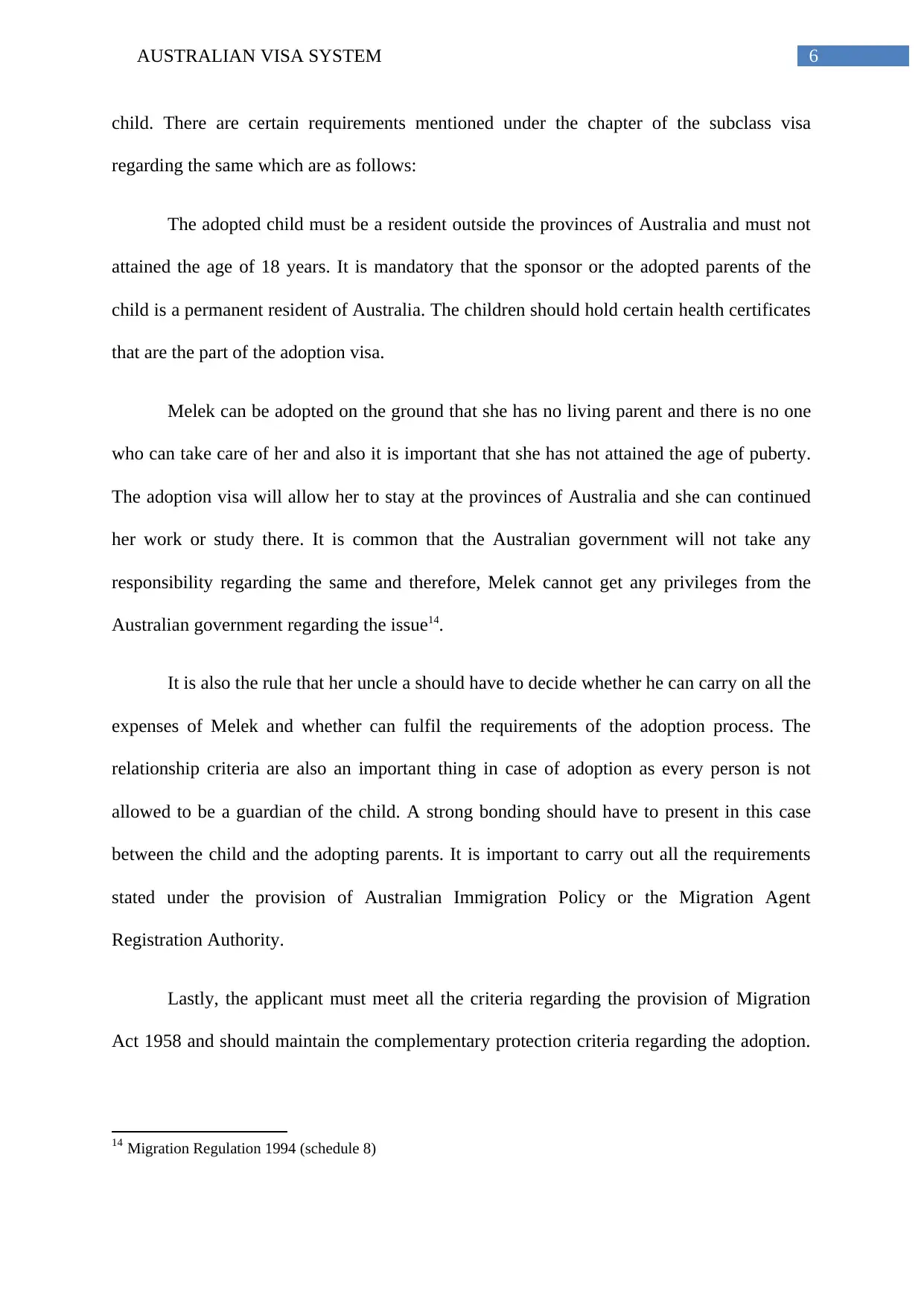
6AUSTRALIAN VISA SYSTEM
child. There are certain requirements mentioned under the chapter of the subclass visa
regarding the same which are as follows:
The adopted child must be a resident outside the provinces of Australia and must not
attained the age of 18 years. It is mandatory that the sponsor or the adopted parents of the
child is a permanent resident of Australia. The children should hold certain health certificates
that are the part of the adoption visa.
Melek can be adopted on the ground that she has no living parent and there is no one
who can take care of her and also it is important that she has not attained the age of puberty.
The adoption visa will allow her to stay at the provinces of Australia and she can continued
her work or study there. It is common that the Australian government will not take any
responsibility regarding the same and therefore, Melek cannot get any privileges from the
Australian government regarding the issue14.
It is also the rule that her uncle a should have to decide whether he can carry on all the
expenses of Melek and whether can fulfil the requirements of the adoption process. The
relationship criteria are also an important thing in case of adoption as every person is not
allowed to be a guardian of the child. A strong bonding should have to present in this case
between the child and the adopting parents. It is important to carry out all the requirements
stated under the provision of Australian Immigration Policy or the Migration Agent
Registration Authority.
Lastly, the applicant must meet all the criteria regarding the provision of Migration
Act 1958 and should maintain the complementary protection criteria regarding the adoption.
14 Migration Regulation 1994 (schedule 8)
child. There are certain requirements mentioned under the chapter of the subclass visa
regarding the same which are as follows:
The adopted child must be a resident outside the provinces of Australia and must not
attained the age of 18 years. It is mandatory that the sponsor or the adopted parents of the
child is a permanent resident of Australia. The children should hold certain health certificates
that are the part of the adoption visa.
Melek can be adopted on the ground that she has no living parent and there is no one
who can take care of her and also it is important that she has not attained the age of puberty.
The adoption visa will allow her to stay at the provinces of Australia and she can continued
her work or study there. It is common that the Australian government will not take any
responsibility regarding the same and therefore, Melek cannot get any privileges from the
Australian government regarding the issue14.
It is also the rule that her uncle a should have to decide whether he can carry on all the
expenses of Melek and whether can fulfil the requirements of the adoption process. The
relationship criteria are also an important thing in case of adoption as every person is not
allowed to be a guardian of the child. A strong bonding should have to present in this case
between the child and the adopting parents. It is important to carry out all the requirements
stated under the provision of Australian Immigration Policy or the Migration Agent
Registration Authority.
Lastly, the applicant must meet all the criteria regarding the provision of Migration
Act 1958 and should maintain the complementary protection criteria regarding the adoption.
14 Migration Regulation 1994 (schedule 8)
Paraphrase This Document
Need a fresh take? Get an instant paraphrase of this document with our AI Paraphraser

7AUSTRALIAN VISA SYSTEM
Therefore, Hasan is advised to choose any of the option stated herein and can claim for the
subclass 102 visa.
Therefore, Hasan is advised to choose any of the option stated herein and can claim for the
subclass 102 visa.
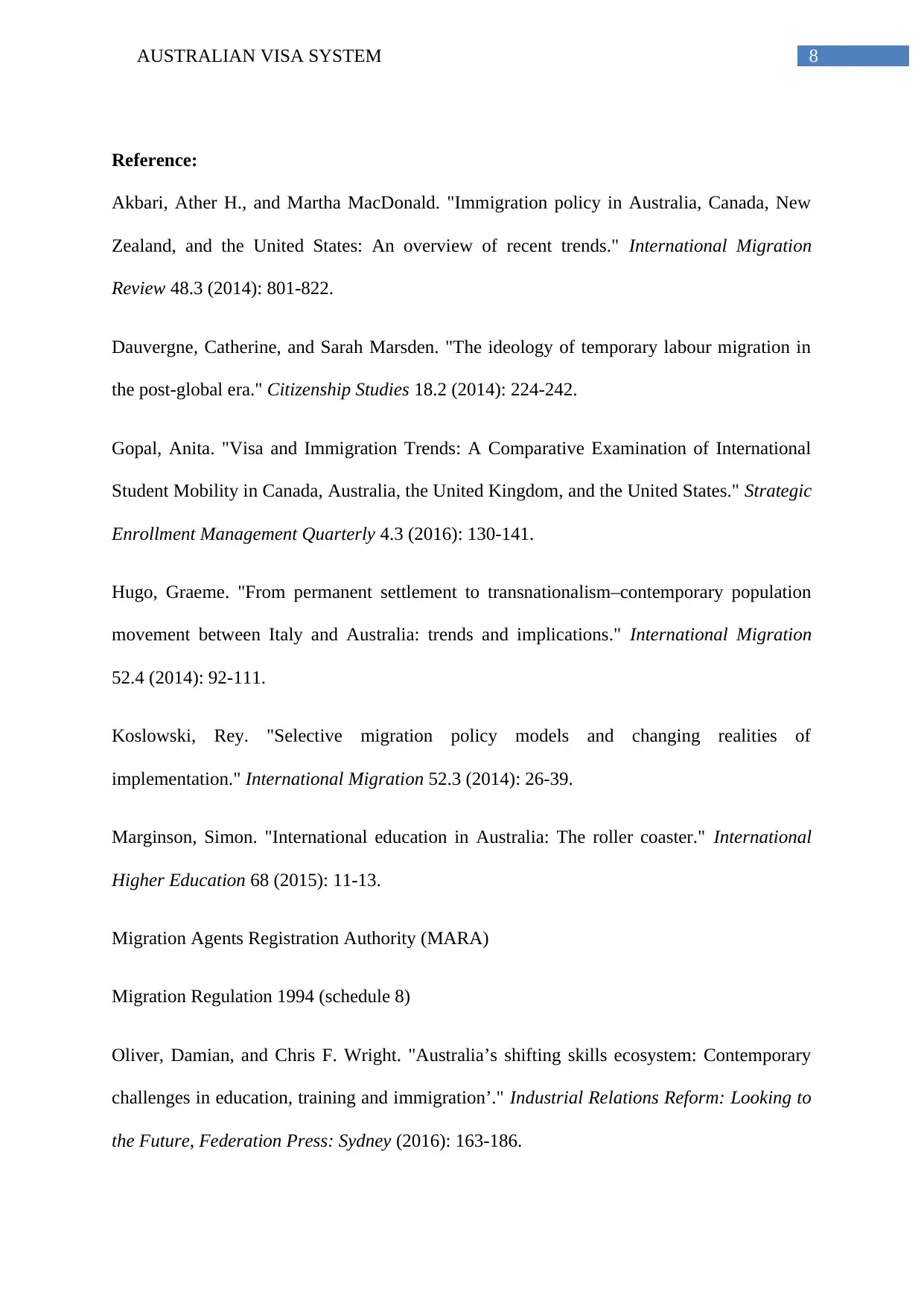
8AUSTRALIAN VISA SYSTEM
Reference:
Akbari, Ather H., and Martha MacDonald. "Immigration policy in Australia, Canada, New
Zealand, and the United States: An overview of recent trends." International Migration
Review 48.3 (2014): 801-822.
Dauvergne, Catherine, and Sarah Marsden. "The ideology of temporary labour migration in
the post-global era." Citizenship Studies 18.2 (2014): 224-242.
Gopal, Anita. "Visa and Immigration Trends: A Comparative Examination of International
Student Mobility in Canada, Australia, the United Kingdom, and the United States." Strategic
Enrollment Management Quarterly 4.3 (2016): 130-141.
Hugo, Graeme. "From permanent settlement to transnationalism–contemporary population
movement between Italy and Australia: trends and implications." International Migration
52.4 (2014): 92-111.
Koslowski, Rey. "Selective migration policy models and changing realities of
implementation." International Migration 52.3 (2014): 26-39.
Marginson, Simon. "International education in Australia: The roller coaster." International
Higher Education 68 (2015): 11-13.
Migration Agents Registration Authority (MARA)
Migration Regulation 1994 (schedule 8)
Oliver, Damian, and Chris F. Wright. "Australia’s shifting skills ecosystem: Contemporary
challenges in education, training and immigration’." Industrial Relations Reform: Looking to
the Future, Federation Press: Sydney (2016): 163-186.
Reference:
Akbari, Ather H., and Martha MacDonald. "Immigration policy in Australia, Canada, New
Zealand, and the United States: An overview of recent trends." International Migration
Review 48.3 (2014): 801-822.
Dauvergne, Catherine, and Sarah Marsden. "The ideology of temporary labour migration in
the post-global era." Citizenship Studies 18.2 (2014): 224-242.
Gopal, Anita. "Visa and Immigration Trends: A Comparative Examination of International
Student Mobility in Canada, Australia, the United Kingdom, and the United States." Strategic
Enrollment Management Quarterly 4.3 (2016): 130-141.
Hugo, Graeme. "From permanent settlement to transnationalism–contemporary population
movement between Italy and Australia: trends and implications." International Migration
52.4 (2014): 92-111.
Koslowski, Rey. "Selective migration policy models and changing realities of
implementation." International Migration 52.3 (2014): 26-39.
Marginson, Simon. "International education in Australia: The roller coaster." International
Higher Education 68 (2015): 11-13.
Migration Agents Registration Authority (MARA)
Migration Regulation 1994 (schedule 8)
Oliver, Damian, and Chris F. Wright. "Australia’s shifting skills ecosystem: Contemporary
challenges in education, training and immigration’." Industrial Relations Reform: Looking to
the Future, Federation Press: Sydney (2016): 163-186.
⊘ This is a preview!⊘
Do you want full access?
Subscribe today to unlock all pages.

Trusted by 1+ million students worldwide
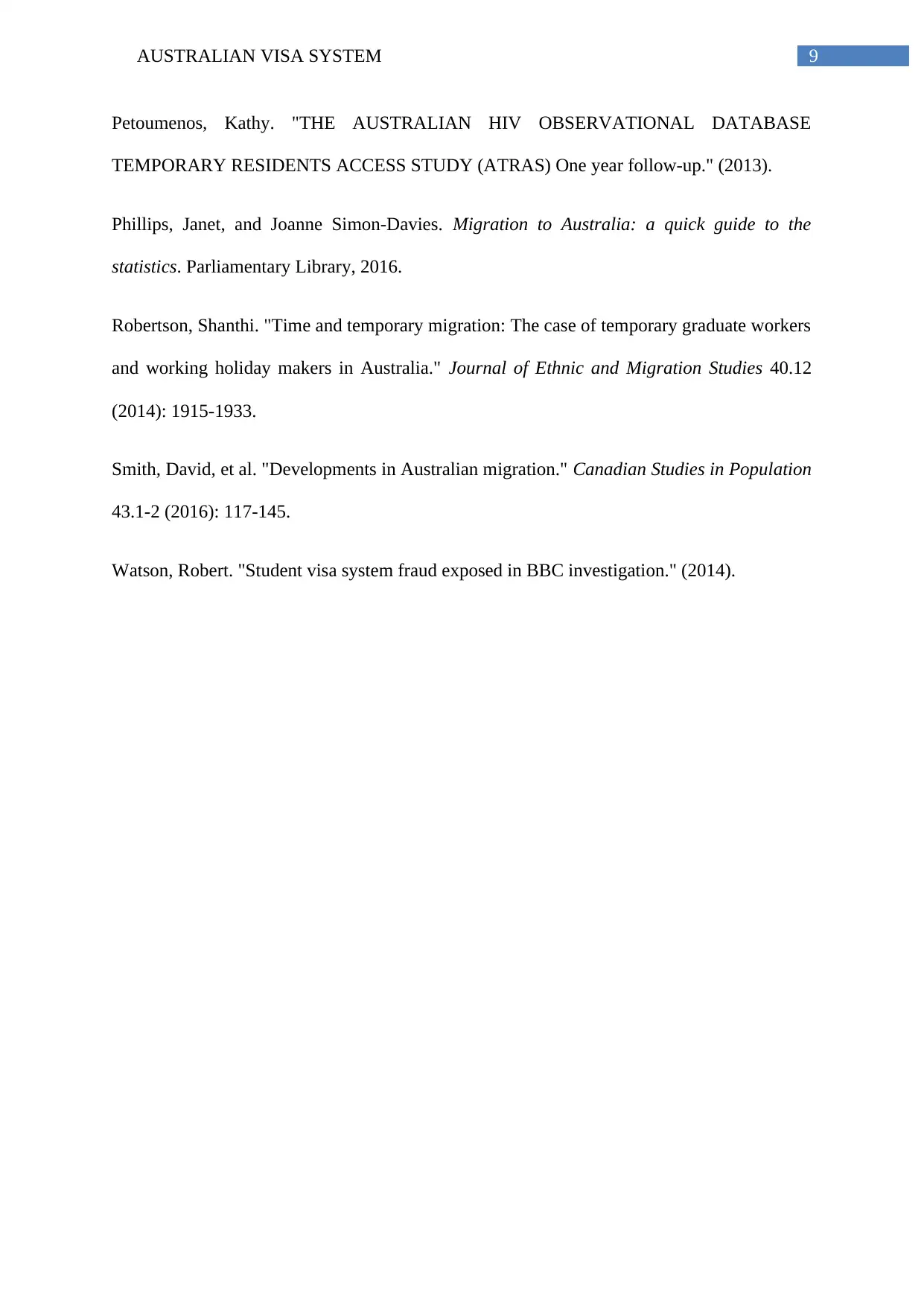
9AUSTRALIAN VISA SYSTEM
Petoumenos, Kathy. "THE AUSTRALIAN HIV OBSERVATIONAL DATABASE
TEMPORARY RESIDENTS ACCESS STUDY (ATRAS) One year follow-up." (2013).
Phillips, Janet, and Joanne Simon-Davies. Migration to Australia: a quick guide to the
statistics. Parliamentary Library, 2016.
Robertson, Shanthi. "Time and temporary migration: The case of temporary graduate workers
and working holiday makers in Australia." Journal of Ethnic and Migration Studies 40.12
(2014): 1915-1933.
Smith, David, et al. "Developments in Australian migration." Canadian Studies in Population
43.1-2 (2016): 117-145.
Watson, Robert. "Student visa system fraud exposed in BBC investigation." (2014).
Petoumenos, Kathy. "THE AUSTRALIAN HIV OBSERVATIONAL DATABASE
TEMPORARY RESIDENTS ACCESS STUDY (ATRAS) One year follow-up." (2013).
Phillips, Janet, and Joanne Simon-Davies. Migration to Australia: a quick guide to the
statistics. Parliamentary Library, 2016.
Robertson, Shanthi. "Time and temporary migration: The case of temporary graduate workers
and working holiday makers in Australia." Journal of Ethnic and Migration Studies 40.12
(2014): 1915-1933.
Smith, David, et al. "Developments in Australian migration." Canadian Studies in Population
43.1-2 (2016): 117-145.
Watson, Robert. "Student visa system fraud exposed in BBC investigation." (2014).
1 out of 10
Related Documents
Your All-in-One AI-Powered Toolkit for Academic Success.
+13062052269
info@desklib.com
Available 24*7 on WhatsApp / Email
![[object Object]](/_next/static/media/star-bottom.7253800d.svg)
Unlock your academic potential
Copyright © 2020–2026 A2Z Services. All Rights Reserved. Developed and managed by ZUCOL.





